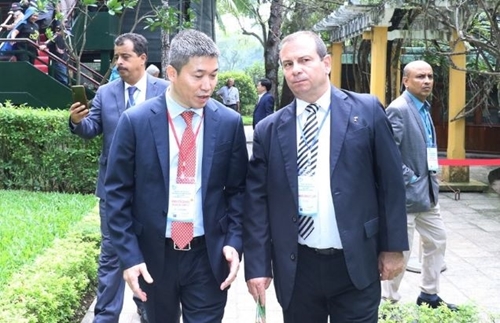Fernando González LLort, President of the Cuban Institute of Friendship with the Peoples (ICAP) and Hero of the Republic of Cuba, was one of the international delegates attending the 22nd World Peace Council in Vietnam.
Having been to Vietnam many times, Mr. Fernando considered Vietnam his second homeland. Returning to the country this time, he and delegates participating in the 22nd World Peace Council laid flowers and offered incense to late President Ho Chi Minh at his mausoleum.
    |
 |
|
ICAP President Fernando González LLort (right) visits President Ho Chi Minh’s Stilt House in Hanoi. |
Sharing his sentiments towards President Ho Chi Minh, Mr. Fernando underlined that the memories of the late President are precious, deeply imprinting in the hearts of the Vietnamese people. His image embodied the modern history of Vietnam and the world as well.
President Ho Chi Minh devoted his whole life to the national liberation of the Vietnamese people, contributing to the common struggle of peoples for peace and national independence. Moreover, President Ho Chi Minh was also a simple man. His ultimate desire was to make Vietnam completely independent, and Vietnamese people completely free, have food to eat and clothes to wear, Mr. Fernando added.
Touring President Ho Chi Minh’s Stilt House, Mr. Fernando was surprised at the simple living and working space of the late President. At this house, he gave strategic directions to the Vietnamese revolution.
ICAP President shared that late Cuban leader Fidel Castro considered Vietnam’s struggle as his own and affirmed that the cause of revolution and national liberation of Vietnam played an important role in world peace. The Vietnamese people underwent numerous fierce but heroic struggles to protect their independence, build socialism, and step up the renewal process.
Talking about studying and following President Ho Chi Minh's thought, morality and lifestyle, Mr. Fernando was delighted that many youngsters and children visit President Ho Chi Minh’s mausoleum to gain more understanding of national history and the late President’s life and revolutionary career.
He confirmed that not only in Vietnam, but also in Cuba, having a profound understanding of national history is essential. It contributes to raising young generations’ awareness of the great sacrifice of ancestors and the value of peace, and helps them learn more about Vietnam-Cuba traditional friendship.
Translated by Quynh Oanh